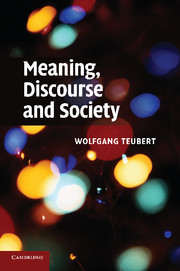Book contents
- Frontmatter
- Contents
- Acknowledgements
- Introduction
- Part I Meaning, the mind and the brain
- 1 The cognitive turn
- 2 The long history of mind linguistics
- 3 What do we know about mental concepts?
- 4 Morphing theoretical sémes into ‘real’ concepts
- 5 From mental representations to conceptual ontologies
- 6 What is meaning?
- 7 Where should we look for meaning?
- Part II Discourse and society
- Conclusion
- Bibliography
- Index
1 - The cognitive turn
Published online by Cambridge University Press: 04 August 2010
- Frontmatter
- Contents
- Acknowledgements
- Introduction
- Part I Meaning, the mind and the brain
- 1 The cognitive turn
- 2 The long history of mind linguistics
- 3 What do we know about mental concepts?
- 4 Morphing theoretical sémes into ‘real’ concepts
- 5 From mental representations to conceptual ontologies
- 6 What is meaning?
- 7 Where should we look for meaning?
- Part II Discourse and society
- Conclusion
- Bibliography
- Index
Summary
In this chapter, I want to argue that the cognitive turn that characterises the second half of the twentieth century has not been able to clear up the mystery of meaning. In the 1950s, the cognitive sciences replaced previous paradigms trying to make sense of human interaction such as the American traditions of pragmatism (Charles Sanders Peirce, William James, John Dewey, George Herbert Mead and Herbert Blumer) and of behaviourism (particularly B. F. Skinner). Both behaviourism and pragmatism have a social focus. Cognitivism, on the other hand, is about the working of the individual mind. It has become a prominent scientific paradigm in many disciplines of the human and social sciences, for instance in psychology, linguistics, anthropology, and philosophy, but also, interestingly, in biology and the computer sciences.
The pragmatists look at symbolic interaction. This is the kind of behaviour to which people assign meanings, and includes the interpretations we, the people, assign to the interactive behaviour of other people. In his investigation of verbal behaviour, the behaviourist B. F. Skinner attempted to correlate the verbal and other symbolic input to which a person is exposed, with their linguistic output (the utterances that person makes). For behaviourists who wanted to observe social interaction, an individual's verbal behaviour seemed to offer the only access to an understanding of how meaning is assigned to interaction.
Information
- Type
- Chapter
- Information
- Meaning, Discourse and Society , pp. 33 - 46Publisher: Cambridge University PressPrint publication year: 2010
